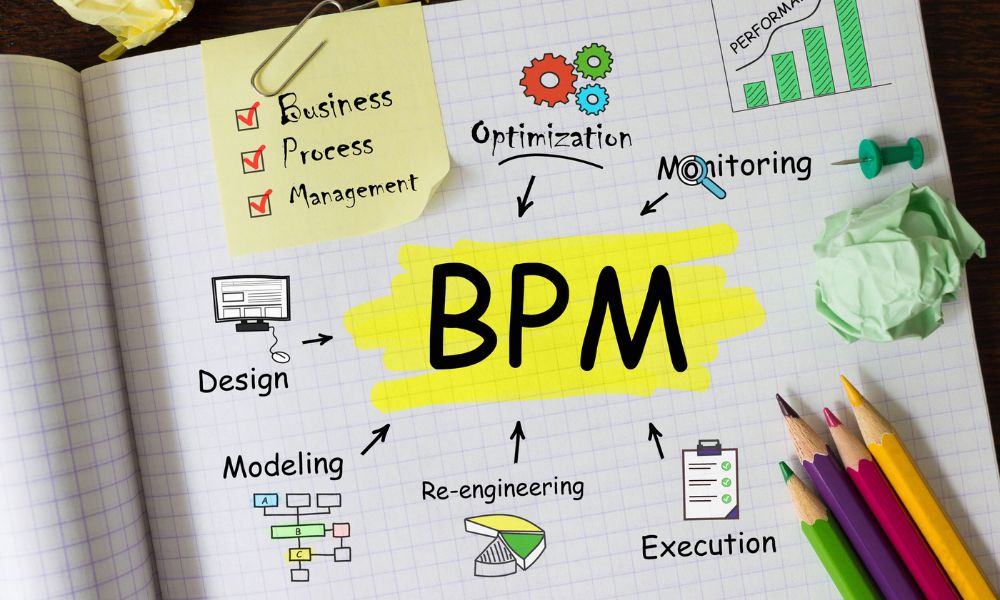In today’s fast-paced business environment, organisations constantly seek ways to enhance efficiency, lower costs, and improve overall performance. One of the most effective strategies to achieve these goals is through Business Process Management (BPM).
Furthermore, this comprehensive guide will explore the various aspects of BPM, including its benefits, tools, software, and consulting services, providing you with the insights needed to streamline your workflows and drive success.
Understanding Business Process Management

Business Process Management (BPM) is a systematic approach to improving an organisation’s processes, improving their efficacy, efficiency, and ability to adjust to shifting business situations . BPM involves analysing, designing, implementing, monitoring, and optimising business processes to achieve specific organisational goals.
Key Benefits of BPM

1. Improved Efficiency: By automating and optimising business processes, BPM helps organisations reduce manual effort, eliminate redundancies, and accelerate workflows.
2. Enhanced Agility: Organisations can swiftly adjust to changes in the market and regulatory environment thanks to BPM, or internal operations, ensuring continued competitiveness.
3. Cost Reduction: By lowering operating costs, process simplification using BPM can result in large cost savings and improving resource utilisation.
4. Better Compliance: BPM helps organisations maintain compliance with industry regulations and standards by ensuring that processes are consistently followed and documented.
5. Improved Customer Satisfaction: By enhancing process efficiency and effectiveness, BPM can lead to better customer experiences and increased satisfaction.
Business Process Management Software

Business Process Management Software (BPMS) is critical to any BPM initiative. BPMS provides the tools and capabilities to design, model, execute, monitor, and optimise business intelligence solution. Some of the best business process management software solutions offer features such as:
1. Process Modelling: Allows users to create visual representations of business processes using flowcharts and diagrams.
2. Process Automation: Further, enables the automation of repetitive tasks, reducing manual effort and increasing efficiency.
3. Workflow Management: Facilitates managing and coordinating tasks and activities across different teams and departments.
4. Performance Monitoring: Provides real-time insights into process performance through dashboards and reports.
5. Integration Capabilities: Allows seamless integration with other enterprise systems and applications.
When choosing the best business process management software, organisations should consider ease of use, scalability, integration capabilities, and vendor support.
Business Process Management Tools

In addition to BPMS, various business process management tools can aid in the BPM journey. These tools offer specialised functionalities to support different aspects of BPM, such as:
1. Process Analysis Tools: Help identify inefficiencies and bottlenecks in existing processes.
2. Process Design Tools: Enable the creation of detailed process maps and models.
3. Process Simulation Tools: Allow organisations to test and validate process designs in a virtual environment before implementation.
4. Process Monitoring Tools: Provide real-time visibility into process performance and help identify areas for improvement.
By leveraging a combination of BPM business process management tools, organisations can achieve a holistic approach to process improvement.
Implementing a Business Process Management System

A Business Process Management System (BPMS) is an end-to-end solution encompassing all aspects of BPM, from process design to execution and optimisation. Implementing a BPMS involves several key steps:
Step 1: Define Objectives and Scope
The first step in implementing a BPMS is to define the objectives and scope of the BPM initiative. This involves identifying the specific processes to be improved, setting clear goals, and determining the desired outcomes.
Step 2: Analyse Existing Processes
Further, conduct a thorough analysis of current procedures to find inefficiencies, bottlenecks, and potential improvement areas. This may involve gathering data, conducting interviews, and mapping current workflows.
Step 3: Design and Model New Processes
Using business process management tools, design and model new processes that address the identified problems and align with the objectives. This may involve creating detailed process maps, flowcharts, and diagrams.
Step 4: Implement and Automate Processes
Implement the new processes using business process management software. This may involve configuring the software, automating tasks, and integrating with other enterprise systems.
Step 5: Monitor and Optimise Processes
Continuously monitor process performance using BPMS dashboards and reports. Identify areas for improvement and make necessary adjustments to optimise processes and achieve desired outcomes.
Business Process Management Solutions

Business process management solutions encompass application support services and technologies to support BPM initiatives. These solutions may include:
1. Process Consulting: Expert guidance and support from business process management consulting firms to help organisations design and implement effective BPM strategies.
2. Process Automation: Technologies and tools to automate repetitive tasks and streamline workflows.
3. Process Optimisation: Techniques and methodologies to continuously improve process efficiency and effectiveness.
4. Process Analytics: Advanced analytics and reporting capabilities to provide insights into process performance and identify areas for improvement.
Organisations can significantly improve efficiency, agility, and overall performance by leveraging comprehensive process management solutions.
Business Process Management Certification and Training

To ensure the success of BPM initiatives, investing in process management training and certification is essential. Individuals that enrol in BPM training programs get the information and abilities necessary to efficiently manage and enhance company operations. Key benefits of BPM certification include:
1. Enhanced Expertise: Certified professionals deeply understand BPM principles, methodologies, and best practices.
2. Career Advancement: BPM certification can open new career opportunities and enhance professional credibility.
3. Organisational Improvement: Trained and certified professionals can drive successful BPM initiatives and contribute to organisational success.
Various business process management certification programs are available and offered by reputable organisations and training providers. These programs typically cover process modelling, improvement, automation, and BPM software.
Business Process Management Consulting

Business process management software consulting services provide organisations expert guidance and support throughout the BPM journey. BPM consultants bring extensive experience and industry knowledge to help organisations design and implement effective BPM strategies. Critical services offered by BPM consultants include:
1. Process Assessment: Further, analysing current procedures in-depth to find inefficiencies and potential improvement areas.
2. Process Design: Developing detailed process maps and models that align with organisational goals and objectives.
3. Process Implementation: Assisting with implementing new processes using BPMN and other BPM tools.
4. Process Optimisation: Continuously monitoring and optimising processes to achieve desired outcomes.
Engaging a reputable business process management company can significantly enhance the success of BPM initiatives and drive long-term organisational improvements.
Successful BPM Implementations

To illustrate the impact of BPM, let’s explore a few case studies of organisations that have successfully implemented BPM initiatives:
1. Financial Services Company
A leading financial services company faced challenges with manual and inefficient loan processing workflows. By implementing a BPMS, the company could automate critical tasks, reduce processing times, and improve compliance. The result was a significant increase in customer satisfaction and a reduction in operational costs.
2. Healthcare Provider
A healthcare provider sought to streamline its patient admission and discharge processes. Through the use of process management tools and consulting services, the provider was able to redesign and automate workflows, leading to improved patient experiences and reduced administrative burden.
3. Manufacturing Company
A manufacturing company aimed to enhance its supply chain processes to lower lead times and improve inventory management. By leveraging process management solutions, the company was able to optimise its supply chain workflows, resulting in increased efficiency and cost savings.
Future Trends in Business Process Management

Moreover, as technology continues to evolve, several trends are shaping the future of business process management:
1. Artificial Intelligence and Machine Learning: Artificial Intelligence And machine learning are integrated into BPM tools to provide predictive insights, automate complex tasks, and enhance decision-making.
2. Robotic Process Automation (RPA): RPA increases productivity and accuracy for organisations by automating repetitive operations.
3. Blockchain Technology: Blockchain’s potential to improve transparency is being investigated, security, and traceability in business processes.
4. Internet of Things: Internet of Things devices are being integrated into BPM systems to provide real-time data and insights, enabling more informed decision-making.
5. Cloud-Based BPM Solutions: Cloud-based BPM solutions are gaining popularity due to their scalability, flexibility, and ease of deployment.
Moreover, by staying abreast of these trends, organisations can continue to leverage BPM to drive innovation and remain competitive in the market.
Conclusion
Effective business process management is a key tactic for organisations seeking to streamline workflows, improve efficiency, and drive overall performance. Organisations can significantly improve process efficiency, agility, and cost savings by leveraging process management software, tools, and consulting services.
Investing in BPM training and certification can further enhance the success of BPM initiatives, providing individuals with the knowledge, talent and skills needed to manage and improve business processes effectively.
Whether you are a small business or a large enterprise, implementing a comprehensive BPM strategy can unlock your organisation’s full potential. This will start you to achieve your goals, aims and stay competitive in today’s dynamic business environment. Embrace the future of BPM and transform your workflows with the right process management solutions.























